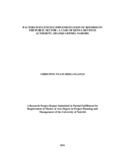| dc.description.abstract | The study sought to investigate factors influencing implementation of reform in Kenya Revenue Authority Headquarters, Nairobi. Objectives of the study were to; examine whether leadership style, top management’s commitment, organization culture and employee skills on implementation of reforms in Kenya Revenue Authority. Descriptive research design was adopted and Kenya Revenue Authority was used as a case study. The unit of analysis was Kenya Revenue Authority and Unit of Observation was employees of Kenya Revenue Authority. The target population was 322 employees of Kenya Revenue Authority. The respondents were selected from; Commissioners, Managers, Supervisors, Officers and Support Staff. The sample of the population was 161 respondents who were selected using stratified sampling technique. The respondents were selected from Kenya Revenue Authority Headquarter, Times Towers. Both primary and secondary data was collected in the study. Primary data was collected using structured questionnaires. Secondary data was collected from internal and published reports on implementation of reforms. Content analysis method was used to analyze the content of published materials ad key themes were selected. Validity and reliability of the research instrument was determined by conducting a pilot study using Postal Corporation of Kenya employees Nairobi. Data was analyzed quantitatively using descriptive statistics. Regression analysis was adopted to determine the hypothetical relationship between independent variables and dependent variable. The analyzed data was presented using tables for easier interpretation by relevant stakeholders. The study established that majority of leaders did not delegate their responsibilities to lower level workers. It was established that bottom up approach was not an organizational culture. The study established that majority of the employees were willing to implement reforms. Further the study established that employees were not motivated appropriated to implement reforms. Finally the study established that the internal and external factors influenced implementation of reforms. It was concluded that, effective implementation of reforms is determined by the organizational leadership, top management support, employee skills, organizational culture and operating environment. For effective implementation of reforms, organizations should invest in people. This study recommends that top leaders should delegate, allocate resources, train workers, motivate and analyze the business environment to implement reforms. | en_US |



